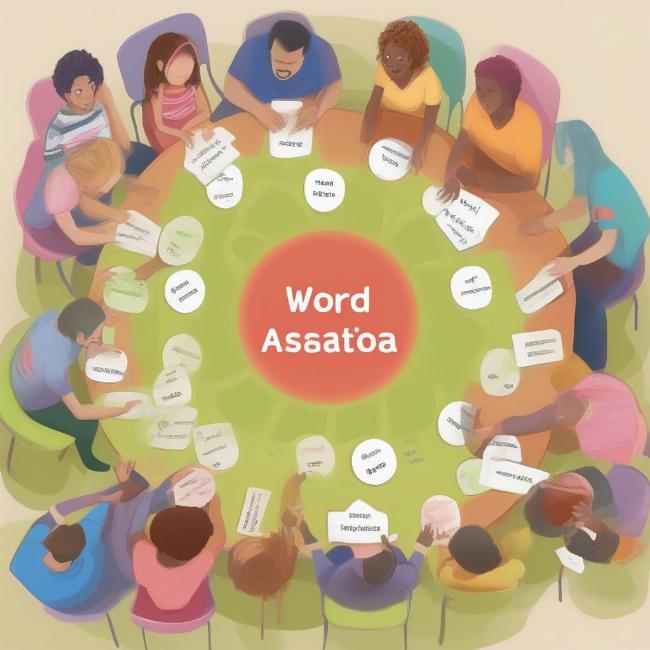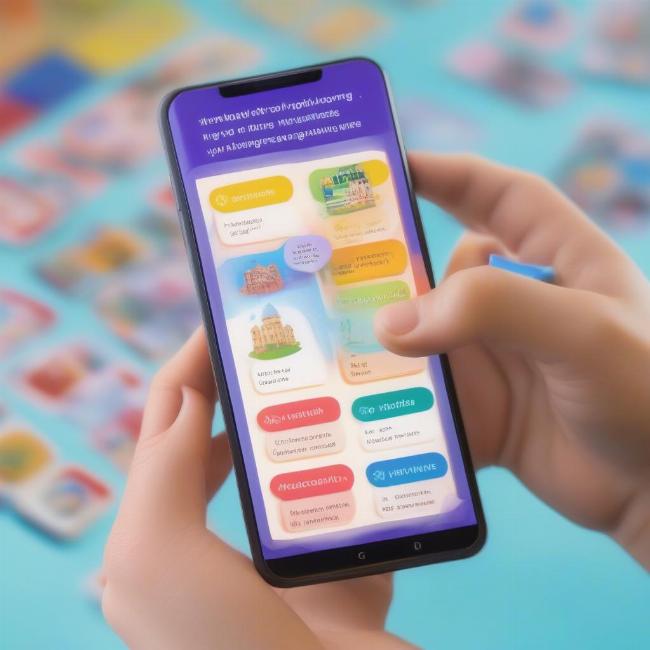Engaging and interactive games are a fantastic way to liven up English learning sessions. Whether you’re a teacher looking to spice up your classroom or a group of friends wanting to practice English in a fun and relaxed setting, incorporating games can significantly enhance the learning experience. They offer a dynamic and immersive environment where participants can actively use the language, boost their confidence, and improve their communication skills without the pressure of formal study.
Tương tự như giáo án các trò chơi dân gian, việc sử dụng trò chơi trong buổi sinh hoạt tiếng Anh cũng mang lại nhiều lợi ích cho người học.
Fun and Effective English Learning Games
There’s a wide array of games that can be adapted for English learning, catering to different skill levels and group sizes. Here are some highly effective and enjoyable options to consider for your next English activity:
- Charades: A classic game that helps develop vocabulary and nonverbal communication. Players act out words or phrases while their team members guess.
- Pictionary: Similar to Charades, but players draw instead of acting. This game focuses on vocabulary and descriptive language.
- Two Truths and a Lie: A great icebreaker and a fun way to practice speaking and listening skills. Each person shares three “facts” about themselves – two true and one false – and the others guess which one is the lie.
- Scrabble or Boggle: Word games like Scrabble and Boggle are excellent for expanding vocabulary and improving spelling.
- Role-playing: Creating scenarios and assigning roles allows participants to practice conversational English in a more realistic context.
 Trò chơi sinh hoạt tiếng Anh nhóm
Trò chơi sinh hoạt tiếng Anh nhóm
Tailoring Games to Specific English Skills
You can tailor games to focus on specific English skills:
Vocabulary Building
- Word Association: Start with a word and have each person say a related word in turn.
- Crosswords and Word Searches: These puzzles can be created with specific vocabulary themes.
Grammar Practice
- Sentence Building: Provide a set of words and challenge participants to create grammatically correct sentences.
- Grammar Bingo: Create bingo cards with grammatical structures and call out sentences.
Pronunciation Improvement
- Minimal Pairs: Use minimal pairs (words that differ by only one sound) to practice distinguishing and producing different sounds.
- Tongue Twisters: Fun and challenging, tongue twisters help improve pronunciation and fluency.
 Trò chơi học từ vựng tiếng Anh
Trò chơi học từ vựng tiếng Anh
Để hiểu rõ hơn về cách làm trò chơi ô chữ trên ppt, bạn có thể tham khảo thêm tài liệu này.
Enhancing English Learning with Technology
Mobile apps and online platforms offer a wealth of interactive English learning games. Many of these resources are free and accessible, providing a convenient and engaging way to practice English anytime, anywhere. Some popular options include:
- Duolingo: A gamified language learning app with a variety of exercises and challenges.
- Memrise: Uses flashcards and spaced repetition to help users memorize new words and phrases.
- Babbel: Focuses on practical conversational skills and offers personalized learning paths.
Choosing the Right Games for Your Group
Consider the age, English proficiency level, and interests of your group when selecting games. For beginners, start with simple vocabulary-based games. For more advanced learners, incorporate games that challenge their grammar and conversational abilities. Always ensure the games are engaging and enjoyable to maximize participation and motivation.
Tips for Successful English Learning Game Sessions
- Create a relaxed and supportive atmosphere. Encourage participants to take risks and make mistakes without fear of judgment.
- Clearly explain the rules of the game. Make sure everyone understands how to play before starting.
- Provide positive feedback and encouragement. Celebrate successes and offer constructive feedback to help learners improve.
- Keep the games short and varied. Maintain interest and engagement by switching between different games and activities.
Điều này có điểm tương đồng với trò chơi tìm nhà cho thỏ powerpoint khi cả hai đều tận dụng công nghệ để tăng tính tương tác và hấp dẫn.
 Ứng dụng học tiếng Anh trên điện thoại
Ứng dụng học tiếng Anh trên điện thoại
Other Interactive Activities for English Practice
Beyond traditional games, there are other interactive activities you can incorporate into your English learning sessions:
- Discussions and Debates: Choose interesting topics and encourage participants to express their opinions in English.
- Storytelling: Have participants create and share stories, either individually or in groups.
- Sing-alongs: Singing English songs is a fun and effective way to improve pronunciation and vocabulary.
Benefits of Using Games in English Learning
Games offer numerous benefits for English language learners:
- Increased Motivation and Engagement: Games make learning fun and enjoyable, which boosts motivation and encourages active participation.
- Improved Communication Skills: Games provide opportunities for learners to practice speaking, listening, reading, and writing in a natural and interactive way.
- Enhanced Vocabulary and Grammar: Many games focus on specific vocabulary or grammar points, helping learners expand their knowledge and improve their accuracy.
- Reduced Anxiety and Pressure: The relaxed and informal nature of games can help reduce anxiety and create a more comfortable learning environment.
- Increased Confidence: Successfully completing game challenges can boost learners’ confidence and encourage them to take risks with the language.
Một ví dụ chi tiết về trò chơi treo cổ powerpoint là việc sử dụng nó trong các buổi học từ vựng, giúp học sinh ghi nhớ từ mới một cách thú vị.
Conclusion
Incorporating games into English learning sessions can significantly enhance the learning experience, making it more engaging, interactive, and effective. By carefully selecting games that align with learning objectives and participant needs, you can create a dynamic and enjoyable environment where learners can develop their English skills and build their confidence. So, next time you’re planning an English activity, consider adding some fun and interactive games to the mix! Share this article with others who are looking for creative ways to enhance their English learning experience.
FAQ
- What are some good online resources for finding English learning games? Websites like ESL Games Plus, Fun English Games, and British Council LearnEnglish Kids offer a variety of free online games for different age groups and skill levels.
- How can I adapt traditional games for English learning? Modify the rules or incorporate English vocabulary and grammar into the gameplay. For example, in a game of “Simon Says,” use English commands instead of the native language.
- What are some simple games for beginners? Word association, picture matching, and basic charades are good starting points for beginners.
- How can I make sure the games are engaging for everyone? Consider the interests of the participants and choose games that are relevant and challenging, but not overly difficult.
- Can games be used for all ages and skill levels? Yes, games can be adapted for learners of all ages and proficiency levels. The key is to choose games that are appropriate for the specific group.
- Are there any apps specifically designed for English learning games? Yes, apps like Duolingo, Memrise, and Babbel offer a gamified approach to language learning.
- How can I incorporate games into online English classes? Use online platforms that allow for interactive activities, such as virtual whiteboards and breakout rooms, to facilitate game play. Đối với những ai quan tâm đến chương trình tổ chức trò chơi lớn, nội dung này sẽ hữu ích cho việc tổ chức các hoạt động ngoại khóa tiếng Anh.